Books
Books
published in 2025

Blank Forms #10 – Alien Roots
The tenth and final anthology from Blank Forms offers an exceptional insight into the work, working methods and thinking of the French pioneer of musique concrète and electroacoustic composition Éliane Radigue, through key texts, a wealth of archival documents (including correspondence, notes and sketches for works, concert flyers, photographs, drawings, reviews, etc.), in-depth interviews and commissioned essays.
This volume explores the early electronic work of French composer Éliane Radigue, whose radical approach to feedback, analog synthesis, and composition on tape has long evaded historical and technical interpretation. Combining key texts, newly translated primary documents, in-depth interviews, and commissioned essays, this compendium interrogates the composer's idiosyncratic compositional practice, which both embraces and confounds the iterative nature of magnetic tape, the subtleties of amplification, and the very experience of listening.
Among these entries is an in-depth overview by cellist Charles Curtis, a close collaborator of Radigue's, examining the composer's earliest experiments with feedback techniques and analog synthesis, her eventual shift to composing for unamplified instruments and live performers, and her unique aesthetic configurations of time and presence. A number of detailed conversations between the composer and researchers Georges Haessig, Patrick de Haas, Ian Nagoski, and Bernard Girard provide crucial insights into her working methods at different points throughout her career. Religious studies scholar Dagmar Schwerk reflects upon Radigue's profound 1988 synthesizer work, Kyema, in the context of Tibetan Buddhist thought and its history, while texts by musicians Daniel Silliman and Madison Greenstone examine, in notably different ways, the technical characteristics of Radigue's sound practice. Sketches for unrealized work, contemporary reviews, concert programs, and other ephemera mapping the performance history of Radigue's early work are presented together for the first time. The anthology concludes with a roundtable discussion between Curtis, Greenstone and Anthony Vine, untangling the knot of paradoxes at the center of Radigue's artistic practice to trace the thread of her continued "ethos of resistance."
Edited by Lawrence Kumpf and Charles Curtis.
Texts by Éliane Radigue, Charles Curtis, Georges Haessig, Patrick de Haas, Ian Nagoski, Bernard Girard, Dagmar Schwerk, Daniel Sillman, Madison Greenstone, Anthony Vine.
Blank Forms' journal brings together a combination of never-before published, lost, and new materials that supplement Blank Forms' live programs. It is envisioned as a platform for critical reflection and extended dialogue between scholars, artists, and other figures working within the world of experimental music and art.
Éliane Radigue (born 1932 in Paris) is considered one of the most innovative and influential contemporary composers, from her early electronic music through to her acoustic work of the last fifteen years. Influenced by musique concrète and shaped by regular sojourns in the United States, where she discovered analogue synthesisers, her work unfolds an intensity which is at once subtle and monumental. Through her deep reflections on sound and listening, not only her music but also her working methods have come to shape a widely resonating set of new parameters for working with sound as musical material.
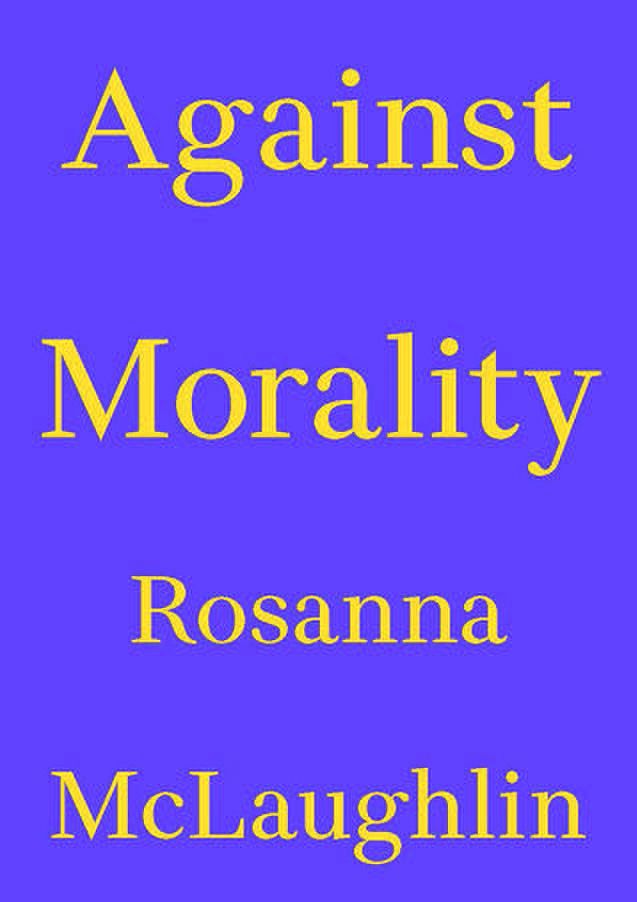
Against Morality
A manifesto against the current moralizing trend in the arts.
Should art be determined by political ideals? In recent decades art institutions have sought to embody liberal values of universal equality and social justice. This move toward greater inclusivity has borne witness to a countervailing trend: artworks are increasingly scrutinized for their political implications, and artists must take care not to transgress particular moral fault lines.
Examining contemporary exhibitions as well as works of art and film, and the broader cultural reactions to them, Rosanna McLaughlin investigates the consequences of this moralizing approach to creative work. She invites us to rethink the connection between political values and art—and to ask whether a relationship between them should exist at all. In arguing against morality in the arts, McLaughlin lays the groundwork for a more expansive concept of difference in twenty-first-century art making.
"What if ambivalences were seen as productive, and not a danger to erase? Would we not begin to know ourselves better? What is it that we are so afraid of finding out? Art is a testing ground for ideas, a means of reaching. What a shame, if we use the space it offers to destroy it entirely."
Rosanna McLaughlin is a writer based in East Sussex and the author of Double-Tracking: Studies in Duplicity (2019) and Sinkhole (2023). Her writing on art and culture has featured in ArtReview, Frieze, Granta, The Guardian, and The White Review, among other publications. Between 2021 and 2023 she was co-editor of The White Review.

Magical Realism. Imagining Natural Dis/order
Exhibition catalogue published on the occasion of the exhibition Magical Realism: Imagining Natural Dis/order at WIELS, Brussels presented from 29 May to 28 September 2025.
How do we imagine life in a world facing global upheaval and ecological challenges?
This book, as well as the exhibition it accompanies, is an invitation to move away from systems driven by endless growth and resource extraction, encouraging renewed ways of conceiving of the ‘natural’ world. When the world of science and hard facts has been separated from the world of magic and intuition, how do we bridge this divide, what are the after-effects and how do we repair? Magical Realism examines how the porosity between ‘magic’ and ‘reality’
may open up spaces for other horizons to emerge in response to proliferating monocultures, precarious lives and climate change. At the confluence of analysis and speculation, the authors and the artists brought together in this book explore paths towards restoring connections in a biosphere exhausted by exploitation, dispossession and debt.
Texts by Karen Barad, Federico Campagna & Febe Lamiroy, Chris Cyrille-Isaac, Sofia Dati, Vinciane Despret & Letícia Renault, Zayaan Khan, Shayma Nader, Susan Schuppli, Dirk Snauwaert.
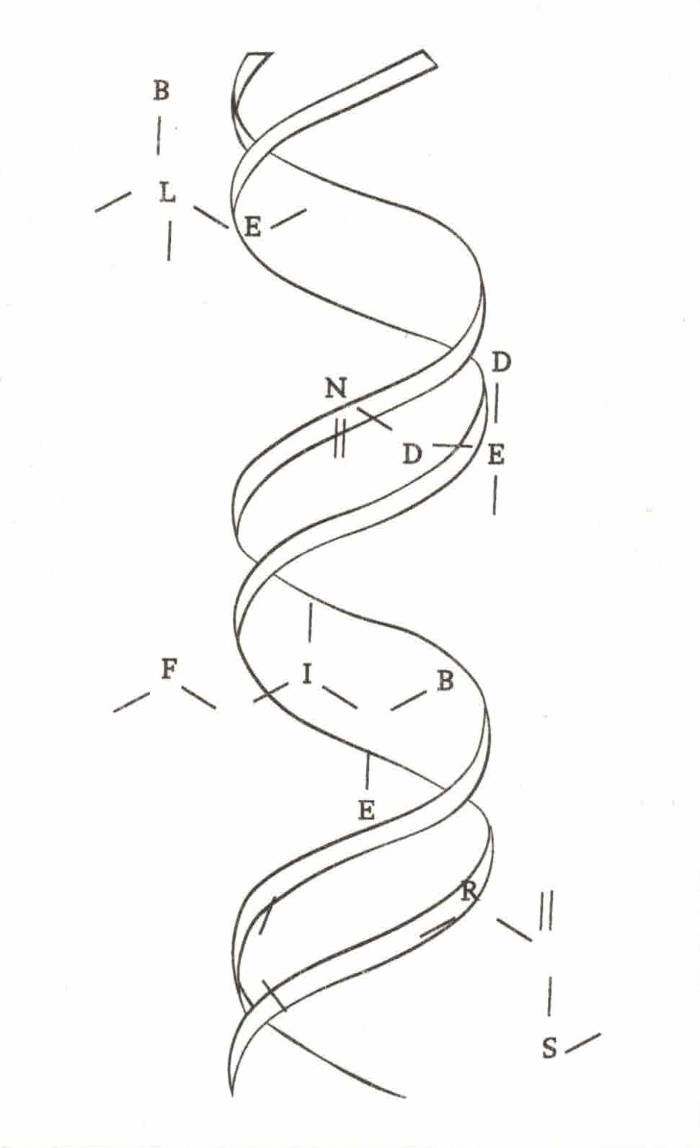
Blended Fibers
Blended Fibers is a visual research book exploring cotton, wool, flax, silk, viscose, and acrylic—six key textile fibers. Bridging analog and digital processes, each chapter begins with a fiber’s microscopic cross-section, which is translated into graphic patterns, basic weave structures, and 3D forms modeled using 3D software. The book moves fluidly between scientific reference and visual experimentation, revealing the geometry and materiality hidden within textiles. Through digital tools and archival sources, Blended Fibers uncovers how the smallest elements of fabric shape its surface, offering a layered, visual understanding of fiber structure and its role in textile design.

Local Woman
A pulpy, mytho-poetic dispatch from an “anarchist jurisdiction” that explores the liberatory possibilities of community and womanhood.
Enter: Local Woman, an archetypal figure, fresh from the forest into the streets of Portland, Oregon. She is a Black trans woman, seeking survival and satisfaction, giving seduction, disenfranchisement, and the contradictions of femme womanhood a face, body, and soul. In sensual, evocative lyrics, Jzl Jmz documents Local Woman’s movement through natural disaster, anti-fascist protest, romantic engagements, and an expanding sense of personal autonomy.

The Golden Book of Words
This landmark early book (its original printing by Angel Hair Books was 750 copies, and they are now extremely rare) by the late great Bernadette Mayer is finally available again, both as a tribute and a joy to read. Mayer was a marvelous poet in every stage of her long and prolific writing life, but many fans especially relish her restless, powerful, sexy, and erudite early work. One of her signal elements is a certain deadpan wit, on full display here with classics such as “Lookin’ Like Areas of Kansas” or “What Babies Really Do,” or the marvelous “Essay”:
I guess it’s too late to live on the farm
I guess it’s too late to move to a farm
I guess it’s too late to start farmingI guess farming
is not in the cards now...
I guess farming is really out...
I don’t want to be a farmer but my mother was right
I should never have tried to rise out of the proletariat
Unless I can convince myself as Satan argues with Eve
That we are among a proletariat of poets of all the classes
Each ill-paid and surviving on nothing
Or on as little as one needs to survive
Steadfast as any farmer and fixed as the stars
Tenants of a vision we rent out endlessly
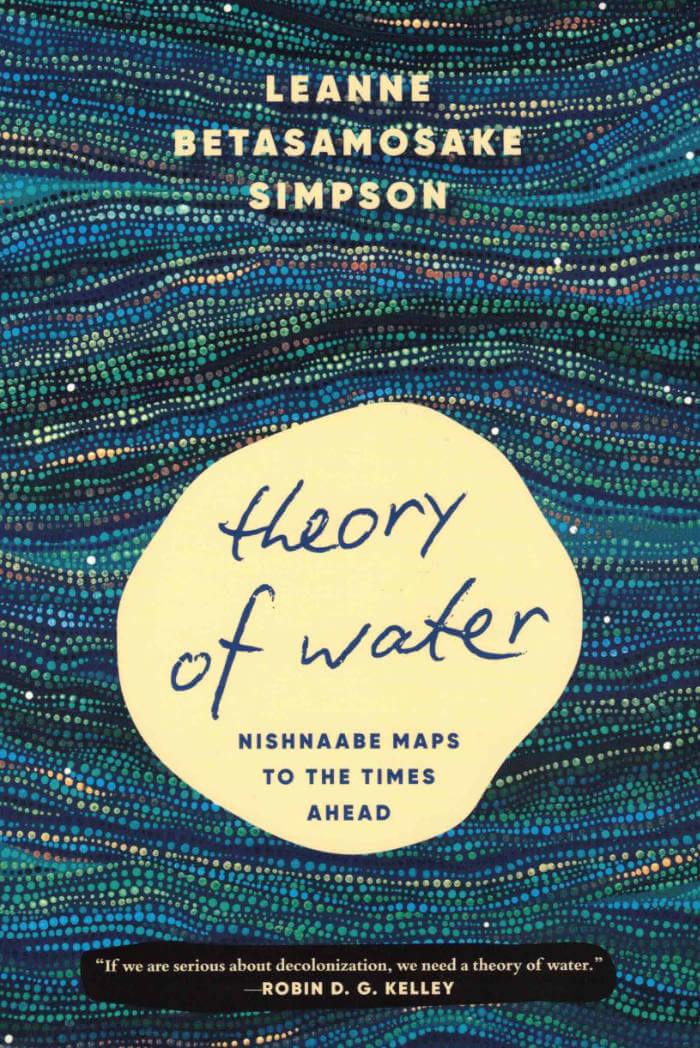
Theory of Water
A genre-bending exploration of that most elemental force—water—through Indigenous storytelling, personal memory, and the work of influential artists and writers.
For many years, Leanne Betasamosake Simpson took solace in skiing—in all kinds of weather, on all kinds of snow across all kinds of terrain, often following the trail beside a beloved creek near her home. Recently, as she skied on this path against the backdrop of uncertainty, environmental devastation, rising authoritarianism and ongoing social injustice, her mind turned to the water in the creek and an elemental question: What might it mean to truly listen to water? To know water? To exist with and alongside water?
So began a quest to understand her people's historical, cultural, and ongoing interactions with water in all its forms (ice, snow, rain, perspiration, breath). Pulling together these threads, Leanne began to see how a "Theory of Water" might suggest a radical rethinking of relationships between beings and forces in the world today. In this inventive work, Simpson draws on Nishnaabeg origin stories while artfully weaving the work of influential writers and artists alongside her personal memories and experience—and in doing so, reimagines water as a catalyst for radical transformation, capable of birthing a new world.
Theory of Water is a resonant exploration of an intricate, multi-layered relationship with the most abundant element on our planet—one that, as Simpson eloquently shows, is shaping our present even as it demands a radical rethinking of how we might achieve a just future.

As If They Had A Spirit: the practice of Pontus Pettersson
As If They Had A Spirit is the first comprehensive monograph of artist Pontus Pettersson. Using drawing and narration, the book expands on Pettersson’s sculptural, poetic and choreographic practice through the accounts and fabulations of long term collaborators. As If They Had A Spirit centers the acts of re-membering, re-telling and re-tracing as situated methods for documenting and studying the protracted and evolving nature of process-based artistic practices.
Recounted and drawn by Linnea Hansander, Robert, Malmborg, Diana Orving, Karina Sarkissova, Sandra Lolax, Stina Nyberg, Anna Koch, Peter Mills, Anna Efraimsson and Galerie (Simon Asencio & Adriano Wilfert Jensen)
Edited and redrawn by Galerie (Simon Asencio & Adriano Wilfert Jensen)
Editing assistance Izabella Borzecka
Published by Galerie, Int
Co-publisher & Distibribution: PAM, Stockholm
As If They Had A Spirit was made possible with generous support by the Swedish Arts Council, Weld, MDT and PAM

Riding In Silence & The Crying Dervish
The work of Iranian-Belgian artist Mashid Mohadjerin (°1976, Teheran) is an intricate tapestry of personal and collective memory, weaving together photography, text, video, and archival material to explore themes of displacement, resistance, and identity.
Family chronicles merge with momentous political events and are set against the background of a broader history of the MENA-region. Mohadjerin uncovers invisible nuances hidden beneath the extraordinary and the familiar.
In Riding in Silence & The Crying Dervish (2025), Mashid Mohadjerin draws from the depths of her family history, unraveling the echoes of migration, forced departures, and the quiet endurance of those caught between worlds. The book builds on her previous work, Freedom is Not Free (2021), where she explored the role of women in movements of resistance across the MENA region. However, in this latest series, she turns her gaze towards the intersection of masculinity, political ideology, and displacement, examining how historical forces shape personal narratives in ways both visible and unseen.
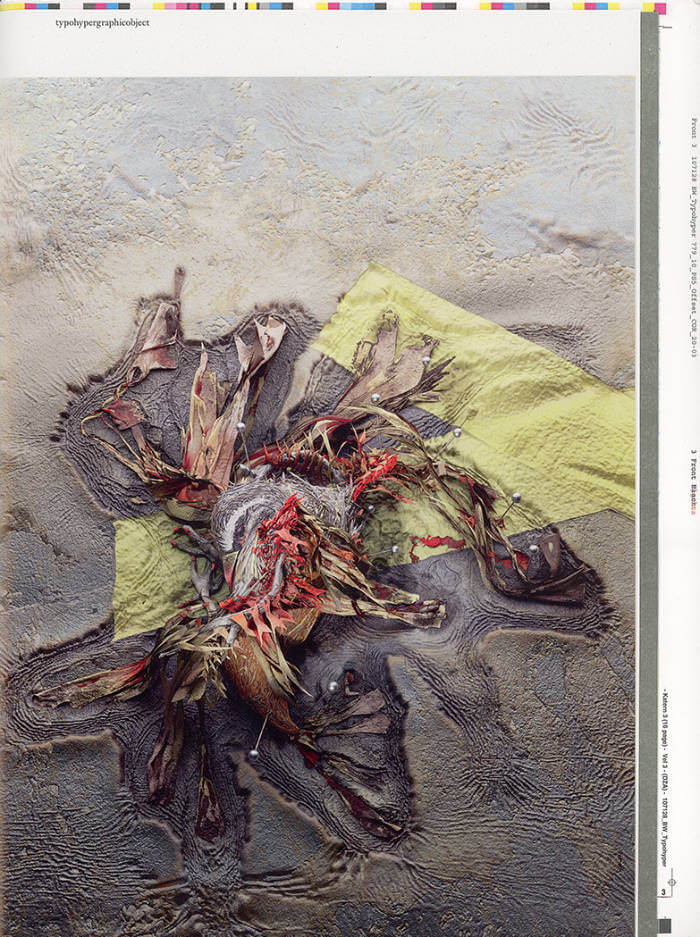
typohypergraphicobject
typohypergraphicobject is a teachable agenda for conscious graphic design.
Written, edited, designed, and published by James Langdon.
typohypergraphicobject is approximately 32×24cm, 52 pages, printed and overprinted in multiple offset and silkscreen inks on make-ready sheets and leftovers from four other books.
Produced with the technical co-operation of die Keure, Bruges; Spreedruck, Berlin; DZA, Altenburg; Kajsa Ståhl, London; OK-RM, London; and Stina Gromark, Stinsensqueeze, Paris.
Contributions from
Brad Haylock
Bryony Quinn
Caleb Klaces and Daisy Hildyard
Gilbert Again with Michael Fowler
Karl Nawrot
Sam Rolfes
Susanne Kriemann

Dominique: The Case of an Adolescent
"Dolto’s Dominique is the only case I’ve found that rivals Freud, and brings us up to date, replete with questions of incestuous trauma, repressed sexualities, autism and cognitive disability, and a profound sense for the contradictions of polite society and histories of colonial and racist violence. I love this child and encountering Dolto’s otherworldly voice as an analyst." — Jamieson Webster
While the child psychoanalyst Françoise Dolto stands alongside Jacques Lacan as a leading light of the Other French School, she has been little translated and remains curiously unknown in the English-speaking world. First published in 1971, Dominique: The Case of an Adolescent is frank and close to the clinical experience. A masterpiece of the genre, it is at once a granular psychological portrait of a troubled adolescent and his familial inheritance, and a historical case study, set in the France of the 1960s, of the of the relationship between subjectivity, nationality, and time and space.
With a foreword by Michael Ryzner-Basiewicz
Translated by Ivan Kats, revised by Lionel and Sharmini Bailly
Cover image by Mike Kelley, Untitled 1975
Françoise Dolto (born 6 November 1908, Paris) was a psychoanalyst and paediatrician. Alongside private practice at her home, where she saw adults and children, Dolto practised in four institutions where she saw only children patients: the Polyclinique Ney, the Centre Claude Bernard, the Hôpital Trousseau and the Centre Etienne Marcel. From 1967 to 1969, Dolto answered adult and child listeners of the French radio station Europe No. 1, live and anonymously under the name ‘Docteur X’. The programme enjoyed excellent ratings, but Dolto found dialogue to be hindered by the demands of live broadcasting and advertising. In 1976, she agreed to return to radio with Lorsque l’enfant paraît on France Inter, on the condition that she replied to listeners’ letters, which enabled her to go into depth. The programme was a huge success, and would make her a household name. In 1978 Dolto retired as an adult psychoanalyst: her fame had become such that it distorted the therapeutic relationship with patients. She now devoted herself to prevention, training of young analysts, group and individual supervision, publications, conferences and radio and television broadcasts. She also continued her work with children in the care of the Aide Sociale à l’Enfance, some of whom she received at her home until the end of her life. In 1979, along with a small team, she founded the Maison Verte, a place for early-years socialisation welcoming children from ages zero to four along with their caregivers, for sessions of play and talk. This model spread throughout France and Europe, to Russia, Armenia and Latin America. Dolto is the author of more than a dozen books, and several essays, interviews and seminars. In English, her books have been translated as Psychoanalysis and Pediatrics (Routeledge, 2013) and The Unconscious Body Image (Routledge, 2022). Françoise Dolto died on 25 August 1988 in Paris.

Witch: Anthology
An exploration of the Witch, as radical archetype, in ancient and contemporary life.
An adult woman haunted by her childhood muses on the foster system, institutions, and the medieval tale of a girl given to a witch. A genderqueer Brooklynite learns of their past life as a murdered sorceress. An uptight participant at a Northern California witch camp finds community in the kitchen. A professor uses magic to help students under attack by right-wing politicians.
In this collection of manifesto, poetry, playscripts, and prose, the archetype of the Witch is honored and unpacked, poked and prodded, owned and othered. From work centered in antiquity to writing which illustrates how primordial occult energies continue to enliven our world today, WITCH: Anthology lays bare a wilderness of myth, magic, trickery, and power swarming beneath the surface of contemporary life.
With work from CAConrad, Edgar Fabián Frías, Amanda Yates Garcia, Ashley Ray, Brooke Palmieri, Yumi Sakugawa, Kai Cheng Thom, Ariel Gore, Myriam Gurba, Fariha Róisín, and many others.

Writing on Raving
McKenzie Wark, Zoë Beery and 1 more
Writing on Raving is the definitive mix of voices from the Brooklyn underground rave scene and beyond, providing fresh language for the shared and infinitely varied experience of dancing through the night until the morning.
New York rave culture is having a moment. The music, mostly, is techno, certain flavors of which became the soundtrack to a dancefloor culture that is queer in a different way to house music centered gay nightlife. Wark, Mak and Beery want to document and annotate and celebrate, but also critique, this world in the making. Writing on Raving centers the New York scene, but isn't limited to it.
This is a book for all of those who need the rave. Who need to dance. Who have at some point needed that beat in their lives. This is a book for all those who have journeyed through the night, through sound, through movement, through chemistry, into other places, other times, other encounters.
This seeking gives us hours, years, on the dance floor to think about why we rave, to locate these reasons in our bodies and the space around us. But the rave is not the place to articulate them. It is too loud; our friends are too distracted, or too high. At the afters, tired and drained and covered in schmutz, we think some more. We look around at our raver friends, and wonder: How did we get here? What happened to us? What is this tentacular, thrashing, swelling thing that we all made together? That thing that is now slumped and aching and coming down now into our fragmentary, singular lives
Between all of us, there are many answers to such questions. Wark, Mak and Beery have gathered their favorite ones to share in this first-ever anthology of writing on raving.
McKenzie Wark is a writer and scholar based in New York City. She is the author, among other things, of Raving (2023) and Life Story (2024).
Geoffrey Mak is the author of Mean Boys: A Personal History (Bloomsbury, 2024).
Zoë Beery is a freelance journalist based in Brooklyn, and a nightlife harm reduction organizer at parties and festivals in the U.S. and Europe.

Vampyroteuthis Infernalis
L'édition inédite et définitive (établie à partir des tapuscrits originaux en français) du traité fabuleux du philosophe tchéco-brésilien Vilém Flusser (1920-1991), une fiction philosophique et poétique qui, par des chemins détournés, nous confronte à la violence et à l'impasse des sociétés contemporaines.
Un monstre venu des profondeurs de l'océan, un poulpe vampire. Sa violence rappelle les nazis, ses mœurs sont libertaires et libidineuses. C'est une créature infernale, cannibale et brutale, pouvant changer de couleur à volonté, et dotée de trois pénis.
Et c'est notre cousin.
Dans cette fable fantastique, Vampyroteuthis infernalis émerge, non des abysses de l'océan, mais du plus profond de nous-mêmes pour nous tendre un miroir, nous montrer à quel point nous, les hommes, sommes ses proches parents et que nos histoires, nos sociétés, nos modes de vie ne sont, au fond, pas si différents.
Ce texte délibérément provocateur du philosophe tchéco-brésilien Vilém Flusser (1920-1991) n'est ni scientifique, ni objectif : c'est une fiction philosophique et poétique qui, par des chemins détournés, nous confronte à la violence et à l'impasse des sociétés contemporaines.
Flusser avait écrit ce texte en français (outre des versions en allemand et en portugais), et ce livre est la première édition du texte original en français. Il est accompagné des fantastiques dessins de son ami l'artiste et « zoosystémicien » français Louis Bec (1936-2018), co-auteur du livre, traduisant en images pseudo-scientifiques les chimères vampyroteuthiques.
Des essais de Marc Lenot, Élise Rigot et Florent Barrère éclairent la démarche de Flusser et de Bec.

A Palestine Solidarity Zine #2
Tamara Hartman, Tabea Nixdorff
This zine is dedicated to documenting the effects of our witnessing on our own work, and on our understanding of the world.Writing down our experiences, reflections and continuously being in conversation, is also rooted in the conviction that we have to build our own archives. We see the enormous efforts undertaken by governments and lobby groups to censor, criminalise and repress the circulation of knowledges, stories and experiences that dismantle zionism, one of the many ideologies that in fact make no one safer, but instead exopse the cruel adaptiveness of colonialism to specific imperial aspirations.
With contributions by Mahmud Abu-Odeh, Gráinnemir Amir Abualrob, Anita di Bianco, Flip Driest, Moosje M. Goosen, Tamara Hartman, Canan Marasligil, Tabea Nixdorff, Shira Wolfe.

Saint is its/Conviction
13 poems of various length.
"I have used a procedure to write them and I am happy to share it, but it isn't what's most important about these poems. The subject matter that, I eventually realised, they share to the extent of justifying bundling them up in one pamphlet is religiosity, what stands between belief and act, be it faith or trust."

Les Metamorpheauxses
Publié en 2025 dans le cadre du projet d'art public The River as Habitat installé dans le Lycée Edward Steichen, Clervaux et commandité par l'administration des bâtiments publics, Luxembourg.
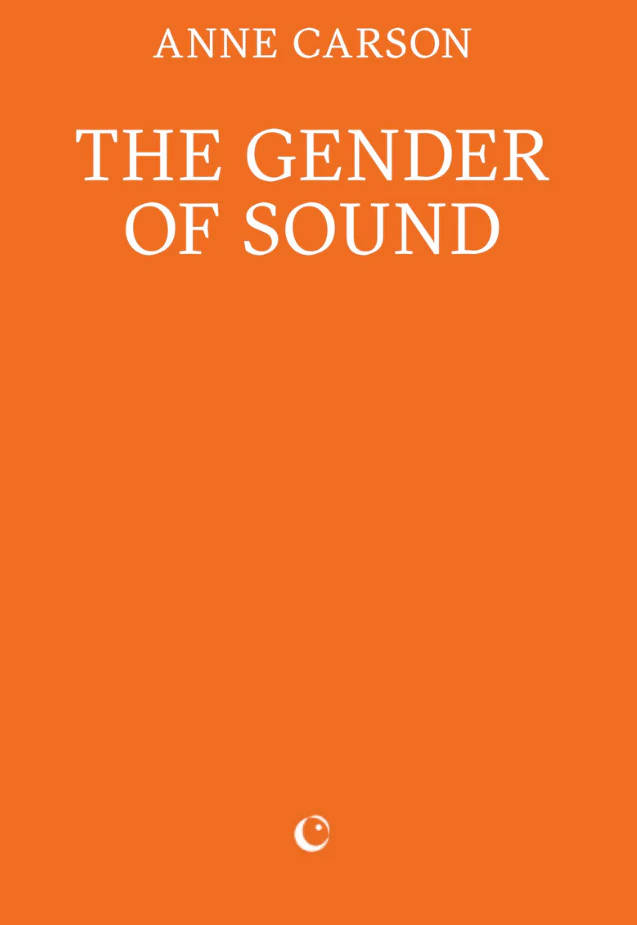
The Gender of Sound
Human history is filled with unacceptable sounds: high-pitched voices, gossip, talkativeness, hysteria, wailing and ritual shouts. Who makes them? Those deviant from or deficient in the masculine ideal of self-control: women, catamites, eunuchs and androgynes all fall into this category.
From the myths of antiquity to Margaret Thatcher via Sigmund Freud and Gertrude Stein, The Gender of Sound charts the gendering of sound in Western culture. Carson invites us to listen again, and in doing so to reimagine our conceptions of human order, virtue and selfhood.
Putting a door on the female mouth has been an important project of patriarchal culture from antiquity to the present day. Its chief tactic is an ideological association of female sound with monstrosity, disorder and death.

The Mirror of Simple Souls
In her first book of poems, Leah Flax Barber revives an actress figure of the commedia dell'arte to consider her own destiny as a soon-to-be historical subject. Taking its title from Marguerite Porete's fourteenth-century Beguine classic, The Mirror of Simple Souls embodies the metaphysical thorniness of the book-as-object through sources as wide-ranging as Renaissance theater, Low German and Old French mystical texts, Kate Bush lyrics, and the melancholy dialectics of Walter Benjamin. In Flax Barber's stark, brutally compressed poems, the performance of writing is charged with the eros and anxiety of coming after: "Will it all be destroyed? / Definitely / I will hear it on my radio / In the 22nd century."
The Mirror of Simple Souls, a series of repeated beginnings and endings, is a form of speech act which, through a Freudian Durcharbeiten, or working through, brings about a new beginning. And, in its movement from this Freudian "working through" to a Hegelian Aufhebung, lets us begin, again, at the beginning, at the end. —CYNTHIA CRUZ
The spare poems of The Mirror of Simple Souls evoke and then draw back into shimmer. Herein, a performance that suffuses the horizon with beautiful absurdity: a shirt sewn with mirrors that reflect a strange and evanescing world-at-large, “an I where the nay was.” Drawing from film, mystical texts, commedia dell'arte, the reader finds that there “is paraphernalia of life / all over.” This paraphernalia is a kind of “segue music” for the endlessly indeterminate. The old adage claims that we can’t step into the same river twice, but Leah Flax Barber creates an evocative, provocative current through which each step is at once past, present, and future. —ELIZABETH ROBINSON
Leah Flax Barber is a daring and brilliant new poet. Her voice is restless and coiled and sprung as we discover "The demonic finalist / Of material culture / Is love / There is paraphernalia of life / All over / A woman.” There is also a take-no-prisoners attitude throughout this startling and powerful book. These poems are vital and necessary and perform “The wounded chance / To think in public.” This book will move you, scare you, and blow you away. —PETER GIZZI
Leah Flax Barber's first book reads like a journey, a kind of anabasis, passing back through the myth and history which are its own antecedents. It manifests, in the encounter, a saturnalian world: ludic, dark and sensuous, strange and vibrant with thought. I was delighted to travel with it. —CLAIRE DeVOOGD
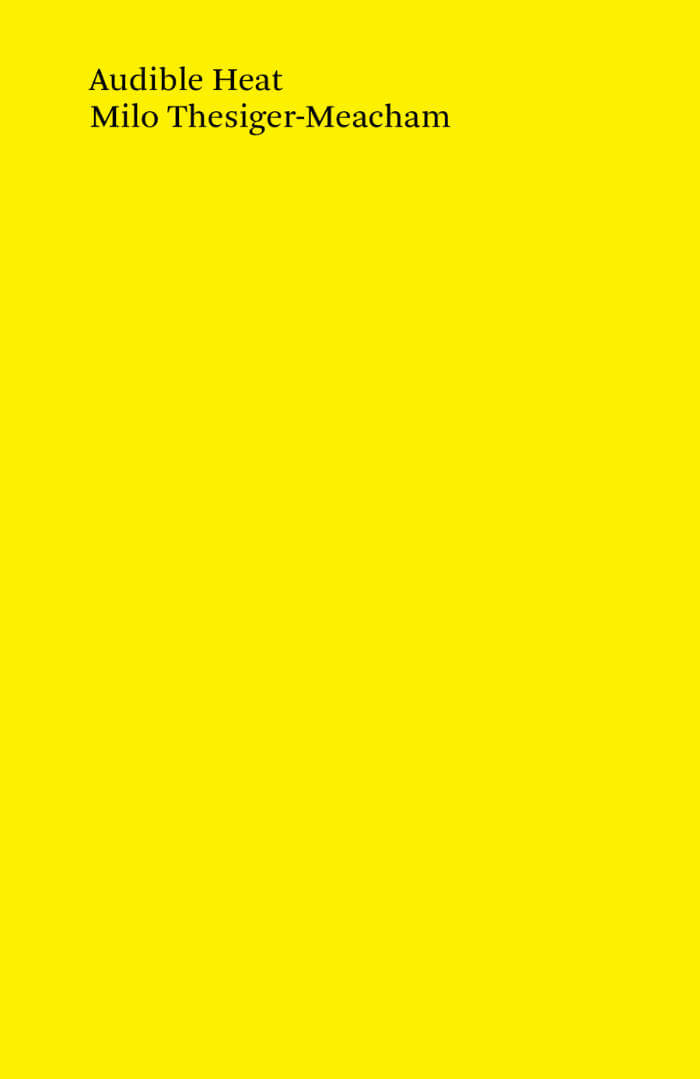
Audible Heat
A manuscript shortlisted for the inaugural edition of the Prototype Prize, 2024, a eulogy to the sonic influence and cultural inferences of the sound of the cicada. A train of thought on the multiform significations and significance of the cicada’s buzz and hum; a dissection and deconstruction of the insect as emblem; a wild and associative suite of fragments on the evocations of background noise when brought to the fore.
Milo Thesiger Meacham’s Audible Heat is a rich, meditative ecotone of ideas; a nimble and associative work of essayism that aims to map a reticulated cultural biography of the sound of the cicada. Equal parts academic argument, travelogue, and critical collage, this synthesis of ideas pulls upon a wide-ranging bibliography of materials to examine the omnipresent sound of the cicada as ‘audible heat’ throughout human history and culture. Herein, this climatic sound acts as a conduit between ecology, identity and mortality, and the cicada’s sonic inference emerges as a codification of the unknown and unfamiliar—as a spiritual weathervane in desert settings—and as a means of teasing out the sensorial limits of human understanding.
Thesiger-Meacham sits himself in a field of enquiry and in dialogue with voices various, ancient, and modern, such as Douglas Yanega of the University of California, folk musician Matthias Loibner, and Gene Kritsky, developer of Cicada Safari, a public app which tracks the mass emergence of periodical cicadas across North America, in a transversal network of interlinked, informational nodes.
Herein, we’ve the sonic-induced anxieties of 17th, 18th and 19th-century colonists in Northeastern America—notably the largely unknown career of entomologist Margaretta Morris—and the apocalyptic premonitions of the indigenous Wampanoag; Greek tongue twisters; the poetry of Ibn Quzmān and Harry Crosby; African American mathematician Benjamin Banneker’s lost wooden clock; Socrates' fear of dehydration; the geopolitical tensions embedded in Southern Spain as Al-Andalus (سُلَدْنَألا); Plato’s Phaedrus; a history of the hurdy-gurdy; Geronimo’s hatred of telegraphy; contemporary and historical entomologies; the slurred, slow body language of Clint Eastwood; insects on the film sets of Sergio Leone's Spanish Westerns; squinting; tanning; metamorphosis; acts of violence in Once Upon a Time in the West (1968); military reenactments of the Battle of Marathon (490 BCE); the botanist Donald C. Peattie’s existential dread; ancient cooking implements; riverside trees hills, and their symmetric reflections in still water…
All ideas emanating from the acoustical atmospherics inherent to the cicada’s song.
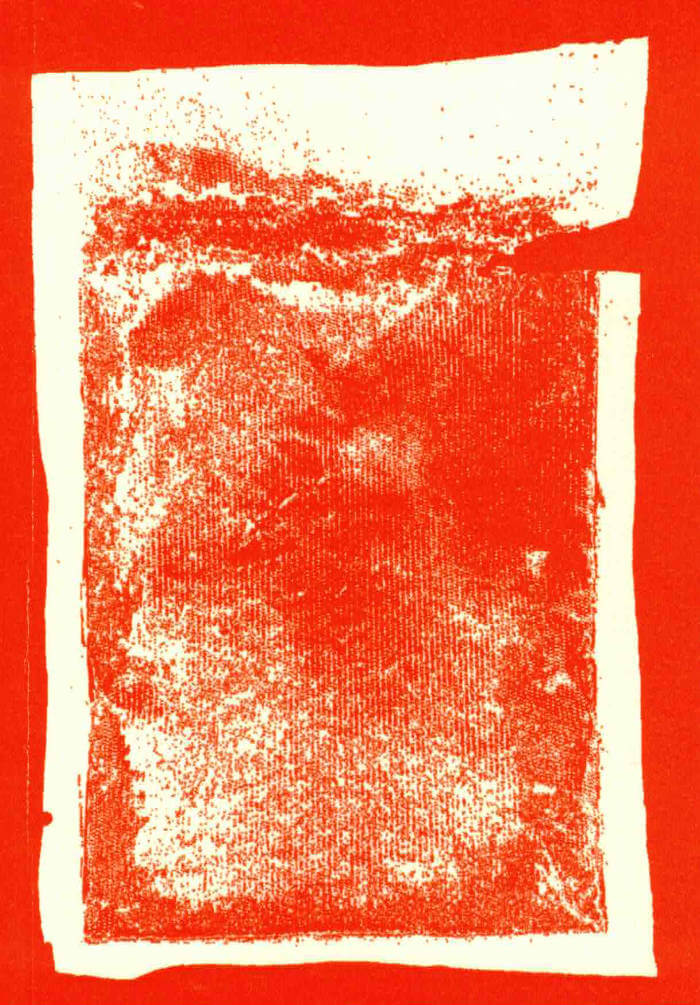
More Than Chilli
Chilli is one of the most popular food ingredients in contemporary China, and symbolic of modernisation. More Than Chilli goes beyond its trendy façade to explore Chongqing, known for its tradition of spicy food. From the perspective as a local, Rossy Liu reflects on her own personal memories associated with chilli. A combination of fragmented scenes, objects, dialogues, movements and sounds are drawn on to unravel the locality of culinary identity. While chilli has become a ubiquitous flavour in today's global society, the book emphasises the hidden intimacy that still exists between Chongqing locals and their unfiltered connection to chilli.
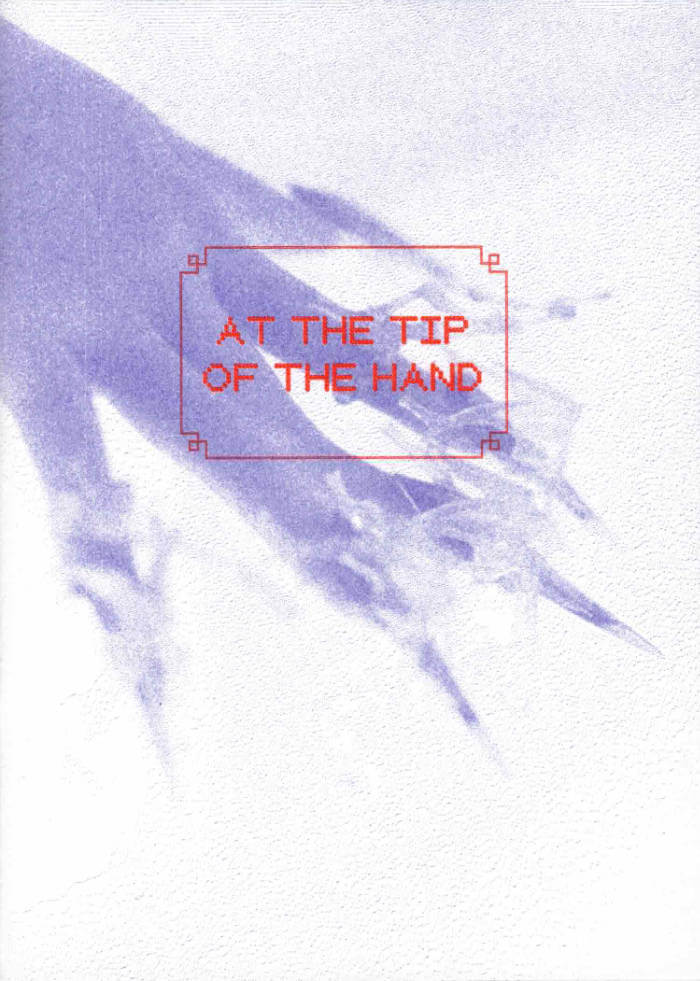
At the tip of the hand
"At the tip of the hand" explores the nail salon as a space of labour and social exchange. The act of two women holding hands, applying polish, and waiting for it to dry is more than a beauty ritual. It is a moment of care, but also a reflection of the social expectations placed upon ‘cultivated’ bodies and the invisible work behind them. Beneath a flawlessly coated nail, unseen bodies persist—serving, tending, remaining out of sight.

Fuel
Traversing multivalent intimacies from the underworld of California’s Central Valley oil fields to the quotidian domestic and love’s painful retraction, Stockton’s poems articulate the blurry modes of extraction, fantasy, loss, gender, and labor as they interact and overlap in the shadow of environmental and personal collapse. Between gas station gifts, Venmo requests, and nocturnal love letters, Fuel unravels the self and violent systems of domination, longing for a togetherness that transcends its own ending.
In these poems, Stockton plunges into petrologic, long drives, the beginnings of ends—whatever enters into love between people and makes it so abstract, or common. In other words, its great subject is the edge, and Fuel is a book of horizons. - Benjamin Krusling
Rosie Stockton is the author of Permanent Volta (Nightboat Books 2021) which was the recipient of the Sawtooth Prize as well as being a finalist for the California Book Awards in Poetry and the Publishing Triangle’s Audre Lorde Award for Lesbian Poetry. Their poems have been published by Social Text Journal, VOLT, Jubilat, Apogee, Mask Magazine, Tripwire and WONDER PRESS. They hold an M.A. in Creative Writing from Eastern Michigan University and are currently a Ph.D. Candidate in the Gender Studies Department at UCLA. Rosie lives and works in Los Angeles.

Blame It On The Rain
The second poetry collection from artist, curator and writer Hana Pera Aoake. The book begins with a placenta placed into a Pohutukawa tree and spirals out across manifold interrogations and anecdotes of the poet’s life. the poetry harnesses a vibrant decolonial commentary on the life/death cycle:
“Bodies that span the past, present and future
It’s non linear, omnipresent, human and non human”
The poetry maps ways in which the lived and living memories of colonial histories are held, endured and warped inside one’s body, which is to say the whole Earth. “Pain and age are knotted together” she states. In many ways the book attempts to illustrate a delicate symbiosis of all living and non-living things, yet localises the pain and joy which manifests from these systems within her own life. The poetry asks how ideology changes the way we love, parent and make art.
Hana Pera Aoake expands these cyclical frameworks of flux and impermanence across her otherwise diaristic and witty verse. Hana Pera Aoake writes on sculpture, anger, labor, detention, greed, genocide, the ocean, the family, sovereignty, sanity and love. The writing spares no opportunity for irony and opinion, housing articulations of political dreaming within a resilient and potent humour. The book is generous in its exploration of Māori belief systems and indigenous solidarity as much as it is on rhythmic, free-associative verse. An exciting and expansive collection of poems.